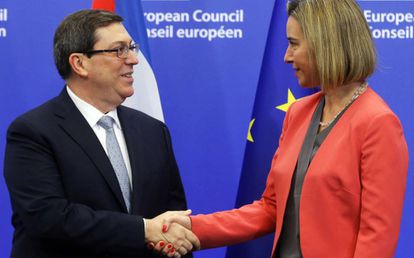EU and Cuba sign off on diplomatic thaw after 20-year freeze
The new deal will lead to normalization of relations between bloc and Havana

The European Union (EU) has dropped its 20-year-old policy on Cuba, which required the country to improve its human rights record before it could strengthen economic ties with member nations. On Monday, Brussels and Havana signed an agreement to normalize relations and open channels for dialogue and cooperation.

After almost two years of negotiations, this pact effectively buries the so-called “common position,” a policy proposed in 1996 by then-Spanish Prime Minister José María Aznar that set human rights and democratic progress as conditions for further negotiations.
Federica Mogherini, the high representative of the European Union for foreign affairs and security policy, the 28 EU foreign ministers and Cuban Foreign Affairs Minister Bruno Rodríguez signed and sealed the pact for political dialogue and cooperation they agreed upon in March.
For the Cuban economy, the relationship with Europe is a priority
Cuba’s foreign affairs chief
Europe has become increasingly focused on Cuba since Havana and Washington reset diplomatic relations two years ago. Brussels is officially making an effort at rapprochement, although Donald Trump’s recent victory in the US presidential election is raising doubts about whether the new administration will maintain Barack Obama’s policy toward the Castro government. Neither Mogherini nor Rodríguez wanted to speculate on what changes the future might hold but they seemed convinced that they will not affect Europe’s relationship with the island.
“Cuba is changing in profound ways. With this agreement, the relationship will reach a new level that will really better reflect the ties between the European Union and Cuba,” Mogherini said in Spanish after the signing ceremony. “For the Cuban economy, the relationship with Europe is a priority,” Cuba’s foreign affairs chief added. The European community is the largest investor in Cuba and its second-largest trade partner after Venezuela.
The Cuban foreign affairs chief thanked Spain for its contribution in developing the agreement
Although many European countries have strengthened bilateral relations with Cuba informally – and thus transgressed the spirit of EU’s “common position” – a new political landscape over the last few years has allowed them to deepen those relationships. The latest agreement has three chapters: political dialogue, which covers issues of governance, human rights and security; cooperation, the broadest and longest of the sections, identifies areas where the two sides can strengthen ties; and the third chapter, economy and commerce, will pave the way for trade deals and investments.
The accord has not yet received the approval of the European Parliament, national legislatures of individual EU nations or the Cuban National Assembly.
Rodríguez also took advantage of his visit in Brussels to meet with his Spanish counterpart, Alfonso Dastis. The Cuban foreign affairs chief thanked Spain for its contribution in developing the agreement to strengthen ties with Europe, diplomatic sources say.
What is the common position?
In 1996, Aznar asked the European Union to make democratic progress a condition for any kind of association with the island. EU members agreed and that stance remained the community’s strategy until now. Yet despite this institutional policy, José Luis Rodríguez Zapatero, Aznar’s successor, revived efforts to build ties with the Castro government.
In 2005, the new Socialist government in Spain encouraged its fellow EU members to lift sanctions imposed on the Cuban government. The EU even recommended opening a political dialogue with Cuba “without taboos” in order to build some kind of relationship with the island but the Castro government’s arrests of political opponents that same year prevented negotiations from going forward. Therefore EU nations ratified the common position. though in 2008 the community would lift sanctions and renew ties with the island.
Traditionally, Spain has set the tone for Europe’s position toward Cuba during the years of close rapprochement and in times when the two sides found themselves most at odds with one another. EU member nations allowed Spain to lead in an area that was never of strategic significance for Europe. But over the last few years, Europe has grown increasingly more interested in Cuba as the Castro government liberalizes its economy and resets diplomatic relations with the United States.
English version by Dyane Jean François.












































